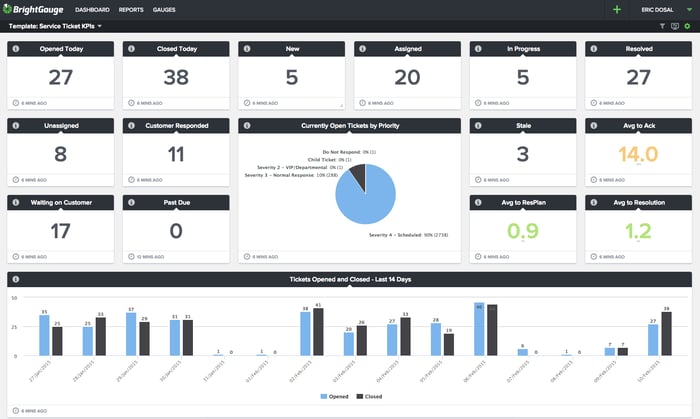Choosing the Most Powerful KPIs for Your Organization

If you are looking to improve the performance of your organization as well as the individuals within it then you will benefit by using key performance indicators (KPIs). Key performance indicators allow you to:
- Increase productivity. You don’t want people doing busy work or focused on the wrong things. Establishing KPIs allows you to determine whether your team is working toward the right goals and what adjustments need to occur to keep productivity high.
- Improve performance. KPI metrics provide a measuring tool for determining if employees are performing at the level expected for their role within the organization, while assisting the company in reaching its strategic objectives.
- Make better decisions. Choosing the appropriate actions to take depends on the goals you want to reach. KPIs help reduce uncertainty by providing a basis for determining which decisions will lead you in the right direction.
To achieve these benefits you must choose the right KPIs, which is something that doesn’t come easily. Here is the BrightGauge Guide to choosing KPIs:
An Overview of KPIs
Many wonder what the differences between a KPI and a regular metric are. It can be difficult to tell the difference, especially when you realize how closely the two are related.
Every KPI is a metric, and every metric has the opportunity to be a KPI (for the right company). So what’s the key to identifying your organization's KPIs?
First, for it to be a key indicator, it must be critical and relevant to the organization’s success. As this Industry Week article suggests, KPIs should measure performance toward the strategic objectives that you’ve laid out as part of your organization’s performance plan. It is absolutely critical that these KPIs measure the most important factors in achieving your success. Stay away from the minutia.
Next, KPIs must be quantifiable, controllable, and repeatable. If team members cannot influence the outcome, you’ll find it difficult to gain their buy-in. Selected KPIs might include improved customer service response rate, increased revenue from the sales team, or a decrease in past due receivables.
A key indicator means the outcome or expectations are measurable. KPIs are a gauge. They should have a specific expected outcome that you can track over time. Finally, when it comes to choosing the right KPIs for your organization, consider your main purpose is to determine how to drive business performance.
How Many KPIs Should You Have?
Well, the short answer is 3, but things are rarely that simple. You’ve got several different departments and people at different management levels who will all be focused on different goals.
The real number of KPIs will depend on the size of your business. So instead of just three KPIs, follow the rule of threes. The best way to explain is with a realistic example of a larger organization’s KPIs:
- Top Level Management:
- Sales Growth
- (Net Promoter Score) NPS
- Employee Engagement
- Mid Level Management:
- Sales:
- Sales Growth
- Opportunities
- Sales by Rep
- Marketing:
- Sales Growth
- Marketing Qualified Leads
- Site Visits
- Service:
- NPS
- Customer Satisfaction (CSAT)
- Average Time to Acknowledgment
- HR:
- Employee Churn
- Employee Tenure
- Employee Engagement
- Sales:
As you can see, upper level management has 3 KPIs and mid level management has 3 KPIs per department. This doesn’t mean that each department needs 3 unique KPIs, they often will share KPIs like Sales Growth and NPS in the example above.
How Often Should You Measure KPIs?
There is no universal rule when it comes to how often you check your KPIs. Each metric is different and every company is different, so where one company may check theirs daily, weekly could be sufficient for another.
We recommend you don’t go longer than a week without checking KPIs, but feel free to experiment and see what works for your company! We keep ours on a dashboard in the BrightGauge HQ so that anyone on the team can tell with a glance how we are performing:
The Service Ticket KPIs dashboard at BrightGauge HQ
How Do You Ensure KPIs Will Increase Performance?
KPIs will increase performance so long as they meet the following conditions:
- Are leading, not lagging indicators of performance
- Reflect areas of the business that impact performance the most
- Measure metrics that when improved guarantee future success
Examples of KPIs that will increase performance are:
- Churn Rate
- Sales Growth
KPIs that wouldn’t increase performance are:
- Net Profit
- Customer Service Awards Won
Should KPIs be Directly Controllable and Manageable?
Yes… and no.
The KPIs you choose should be able to be impacted by the actions of managers and staff, but you don’t want them to have direct control over the metric. A great example of how controllable a KPI should be is Net New Customers.
Net New Customers can be impacted by the actions of sales and marketing staff, but short of buying the product themselves, there is no way to directly control the KPI. This forces your staff and management to generate and close more leads, increasing performance.
How Should Your KPIs be Visually Displayed?
Even if you choose the best KPIs, a lack of visualization tools can hinder your ability to increase your business’s performance. In order to ensure you’ll be increasing performance on all levels you should be displaying your KPIs on dashboards around the office and in reports distributed amongst your team.
Our customer, Nucleus Networks, uses dashboards throughout their office to display KPIs
Recap on Choosing Your KPIs:
KPIs are a useful tool for creating a high-performing culture. They allow you to balance quantitative and qualitative measures to understand desired performance, but in order to achieve these benefits you have to remember to:
- Follow the rule of threes when determining how many metrics to choose.
- Measure your KPIs as often as necessary, but no later than weekly.
- Choose KPIs that increase performance.
- Choose KPIs that can be impacted by your team, but can’t be directly controlled.
- Display your KPIs on a dashboard around the office and in reports sent to your team.
Need KPI inspiration? Check out 70+ metrics for MSPs, plus their accompanying formulas:
Free MSA Template
Whether you’re planning your first managed services agreement, or you’re ready to overhaul your existing version, we've got you covered!





